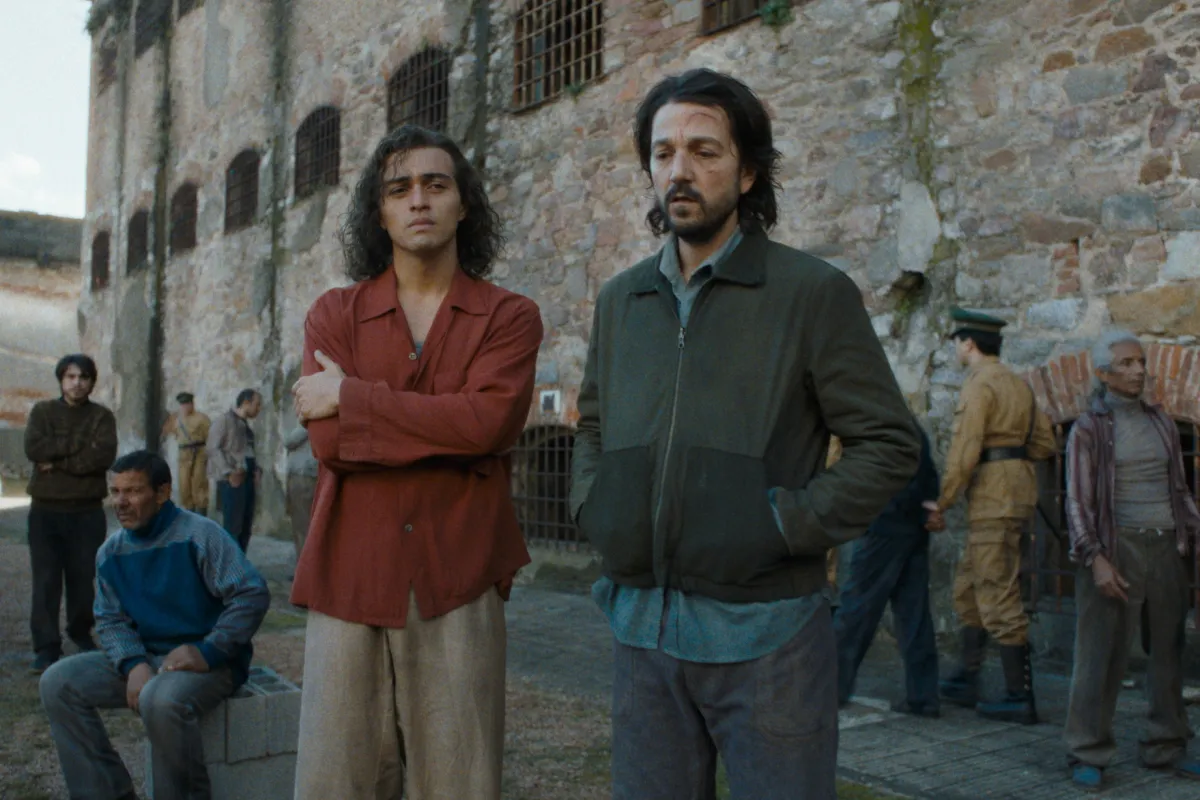In Review: ‘A House of Dynamite,’ ‘After the Hunt,’ ‘Kiss of the Spider Woman’
An all-reviews week continues with an apocalyptic docudrama, a cancellation story, and a political meta-musical.

Due to the abundance of new releases we're making this one of The Reveal's occasional "Oops! All Reviews" weeks.
A House of Dynamite
Dir. Kathryn Bigelow
112 min.
It begins like any other day. It doesn’t stay that way for long. While members of the government and military start their morning, a single nuclear missile of unknown origin begins streaking across the Pacific on its way to a target somewhere in the American Midwest. No one knows where it’s coming from, but everyone knows what to do. The U.S. has put systems in place for just such a scenario. Then, one by one, those systems fall short and stopping the missile from its target starts to look less and less likely. Then A House of Dynamite, the latest film from Kathryn Bigelow, loops back and lets the same events play out from a different perspective. Then, like a nightmare playing on repeat, the film does it again.
The film’s structure comes with some built-in restrictions, limiting how well we can get to know House of Dynamite’s many characters, who range from low-ranking soldiers to the highest rungs of power. But it also challenges a first-rate cast to tease out their characters’ hidden depths. In one scene, before all hell breaks loose, the way Olivia Walker (Rebecca Ferguson) firmly chides a newcomer for holding up the breakfast line with an order that’s not one of the two acceptable options—oatmeal or egg sandwich—tells us a lot about who she is in a single exchange. As the intensity mounts, the Secretary of Defense (Jared Harris) uses the crisis to play out an understated drama of estrangement with his daughter (Kaitlyn Dever). Playing the never-named President, Idris Elba suggests both his character’s commanding charisma and deep limitations. As in the film itself, everyone seems to understand they have limited space and time to get the job done.
Scripted by Noah Oppenheim (the former NBC News head whose screenplay credits include Jackie), A House of Dynamite almost seems designed to frustrate those looking for a story with a distinct beginning, middle, and end. The story’s first and third acts remain mysteries. Bigelow wants instead to focus on every possible element of the second-act disaster, revisiting them in ways that cast them in a different light without suggesting the events could take a different course. It’s not just that, past a certain threshold, only bad options remain. It’s that virtually every option beyond that threshold will lead only to an apocalyptic outcome. Since The Hurt Locker, Bigelow has come to specialize in building drama out of scrupulous attention to the details of the worlds in which her films are set. That she and Oppenheim have clearly done their homework about how such a scenario would play out and the many possible catastrophes it might create makes A House of Dynamite both terrifying in the moment and haunting after the fact. —Keith Phipps
A House of Dynamite opens in theaters this Thursday ahead of its Netflix premiere on October 24.


After the Hunt
Dir. Luca Guadagnino
139 min.
Right from the opening titles, which mimic the white-on-black Windsor font of the mega-cancelled Woody Allen—hinting at the assemblage of fucked-up elite/elite fuck-ups that follow—there’s something almost heroically off-putting about Luca Guadagnino’s After the Hunt. Emerging at a time when “anti-woke” reactionaries have been diligently grinding the #MeToo movement into dust, the film adds its voice to the conversation like a Harper’s letter signatory or a redundant new columnist for The Atlantic. It creates a mess in order to absolve most of the mess-makers, as if to demonstrate that everyone is a tangle of compromise and impulse, and thus no one should be held to a higher standard. It’s a film for jerks who expect forgiveness without ever feeling contrite and who lash out at anyone, especially the younger generation, for buzzing like gnats in their ears about it. It rejects binaries while reserving contempt for the non-binary.
In other words, After the Hunt is Oleanna 2.0, a muddier but no less reactionary modern spin on the issues that David Mamet once tackled in his polarizing two-hander about sexual politics and power dynamics on campus. Yet much like Oleanna, there’s a confrontational edge to the material that’s undeniably compelling, like getting sucked into a debate against your better judgment. Nora Garrett’s script doesn’t have anything like Mamet’s clarity and pop, but it does have the aid of a mostly excellent group of actors and a rough-around-the-edges quality that often serves it well. As manipulative as the film can be at times, it’s not always easy to tell where it’s going or what shape this train will make when all the boxcars are finally done colliding.
After the Hunt doesn’t waste much time throwing its characters’ lives into disarray, but it allots itself far too much space in sorting them out. At a party hosted by Alma (Julia Roberts), a Yale philosophy professor, and her devoted psychiatrist husband Frederik (Michael Stuhlbarg), Alma’s young protégée Maggie (Ayo Edebiri) leaves with her friend Hank (Andrew Garfield), a colleague who’s joining her on the tenure track. Hank has a reputation for being a bit flirty with female students, but Alma doesn’t think much of it when he steps out with Maggie, who’s currently shacking up with a non-binary law student Alex (Lío Mehiel). Alma doesn’t think anything of it when Maggie doesn’t show up at class the next day, but she’s startled to find her waiting at her apartment entrance that evening, claiming that Hank “crossed the line.”
This tense scene between Alma and Maggie, the first of many to come, has a disturbing tenor that promises a better film, as Alma listens to Maggie’s claim with a combination of sympathy and calculation that’s not what her student expects from her. When it comes time to hear Hank’s side of the story, which implies retribution over a credible accusation of plagiarism, Alma doesn’t quite give him the audience he expects, either. She’s hung up in a lose-lose situation between the two parties, one made worse by an incident from her own past that Garrett’s script treats as a Shaq-sized shoe to be dropped later. On top of all this stress, she’s abusing prescription drugs to combat acute, chronic abdominal pain and Frederik, who looks after her like a doting parent, carries around his own low-buzzing hostility.
Guadagnino doesn’t play any of this deftly. He’s a sensualist and maximalist by nature, which serves him well in films like Call Me By Your Name and Challengers, but betrays him here. Working with cinematographer Malik Hassan Sayeed, who shot ’90s Spike Lee films like Clockers and He Got Game, Guadagnino pushes asymmetrical frames and off-kilter blocking to the extreme while jamming up the soundtrack with the metronomic clicks and aggressive discord of Trent Reznor and Atticus Ross’ score. But what ultimately undoes After the Hunt is how much it stacks the deck against Maggie, whose identity as a Black LGBTQ+ student is treated as tokenism, a cover for her intellectual laziness and hidden privilege. (She has that in common with Carol, the twentysomething accuser that Mamet clearly detests in Oleanna.) The cast does well to make the button-pushing read like complexity—Stuhlbarg, the secret MVP of Call Me By Your Name, acquits himself best here, too— but it all looks a bit like Guadagnino is pleading for mercy for adults who should know better. No, thanks. — Scott Tobias
After the Hunt opens tomorrow night in select theaters.


Kiss of the Spider Woman
Dir. Bill Condon
128 min.
When Luis Molina (Tonatiuh), a queer window dresser serving a prison sentence for “indecency,” moves to a new cell, he doesn’t arrive empty handed, bringing with him several bags whose contents include beaded curtains and stills and posters from Hollywood’s golden age. Molina’s especially fixated on the work of Ingrid Luna (Jennifer Lopez), a star who never let Hollywood erase her Latino heritage. Molina’s cellmate Valentin (Diego Luna) has little time for this nonsense, at least at first. A revolutionary opposed to the military junta that’s taken control of Argentina, Valentin devotes every waking hour to studying ways to better advance the cause. He also understands he’s been kept alive only because the government believes he has some information crucial to their efforts to crush the opposition, efforts that have grown increasingly desperate as its grip on power weakens. The year is 1983, the junta’s final year. But neither Molina nor Valentin can know this. And nothing guarantees either will outlast the regime. To pass the time, Molina recreates one of Luna’s most florid films for Valentin, who doesn’t take long to warm to his cellmate or become a receptive audience for Molina’s performances, a musical titled Kiss of the Spider Woman whose characters and plot contains unexpected echoes Valentin and Molina’s lives.
Written and directed by Bill Condon (Chicago, Dreamgirls), Kiss of the Spider Woman adapts an early-’90s musical created by writer Terrence McNally with songs by John Kander and Fred Ebb. That musical adapted Argentinian writer Manuel Puig’s 1976, which was previously adapted into a 1985 film starring William Hurt and Raul Julia and directed by Héctor Babenco. Though Condon’s Spider Woman diverges from the plot of the previous film (and Puig’s novel) in some significant ways, it keeps the central conceit. Life is dull, dirty, and oppressive inside the prison. But Molina’s cinematic obsession means a world of movie magic is never far away. Condon swaps in Technicolor fantasy for the black-and-white melodrama of Babenco’s film and, at first at least, keeps the musical sequences confined to scenes in which Molina recounts the film-within-the-film’s increasingly ludicrous plot, in which Luna plays both a fashion magazine editor named Aurora and the fearsome and mysterious supernatural Spider Woman. But instead of the actors playing Aurora’s gay-coded best friend and love interest, Molina swaps in, respectively, himself and Valentin. As the prison warden’s efforts to crack Valentin intensify, Molina and Valentin’s own relationship takes on an unexpected intimacy.
Though thoughtfully mounted, Condon’s film never comes fully to life, even in the “movie” scenes that do their studied best to capture the look and feel of classic MGM musicals without really capturing their heart. That, despite featuring the work of Kander and Ebb, a truly memorable song doesn’t arrive until the film’s climax certainly doesn’t help. (Kander contributed three new songs working from material left behind by Ebb, his lyricist partner, who died in 2004.) Still, Lopez successfully brings the required movie-star glamor and Luna and Tonatiuh (whose standout performance slowly takes over the film) develop a complex rapport as Valentin and Molina each recognize intersections of the personal and the political they’d never previously considered. Yet while Luna and Tonatiuh play characters transported by movies, the film in which they appear never quite summons the same power. —Keith Phipps
Kiss of the Spider Woman arrives in theaters on Thursday night.

We keep reviews free to all readers at The Reveal but reviews are far from all we do. As part of this "Oops! All Reviews" week we're unlocking some relevant pieces previously available only to paid subscribers to offer a sense of the wider scope of The Reveal available with a paid subscription.
"Apocalypse? Now?: 60 Years Later, This Low-Budget Vision of the Apocalypse Remains Unnervingly Timely"
An appreciation of Ray Milland's nuclear war drama Panic in Year Zero.
"Woody Allen in Exile"
A look at the filmmaker's recent, (understandably) little-seen efforts.
Worst to Best: Music Videos Set in Movie Worlds
A ranking of music videos that draw their artists into their movie's worlds.




Discussion